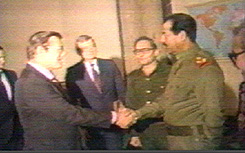Nene said:
Our debt is through the roof, thousands of dead Americans, millions of dead Iraqis. I'm not seeing how this isn't totally negative. 700 billion??? We could've paid for everyone's healthcare and wouldn't be having this problem right now. Oh, Halliburton made a ton of money, I guess thats the silver lining. :whistle:
Have you considered the possibility that we've also helped establish another fledgling democracy in the Middle East, which could have
profound implications for that region in the future?
Nene said:
Also, we did know there weren't weapons of mass destruction. The Bush administration used false intelligence, rhetoric and propaganda to pull the wool over the American people's eyes.
The Bush administration really did believe that there were WMDs in Iraq. I'm not saying that they always used good judgement to promote that idea, or were beyond using rather questionable evidence; but they _did_ believe it.
Nene said:
I trusted the UN to decide if Iraq was working on dangerous weapons and according to them, they weren't. The international community knew it was a bunch of BS.
Huh? Where did you get THAT idea?

There were other foreign intelligence services which believed it, too, like the Russians and Germans (if I remember correctly).
Nene said:
Besides, lots of hostile nations have or are suspected of having WMDs and you don't see us invading all of them do you?
No, of course not. We obviously have to choose our battles carefully, we can't just take on the entire rest of the world (we can't invade North Korea, for example). But our military experts _did_ think we could stage a successful invasion of Iraq, which is why they did it.










